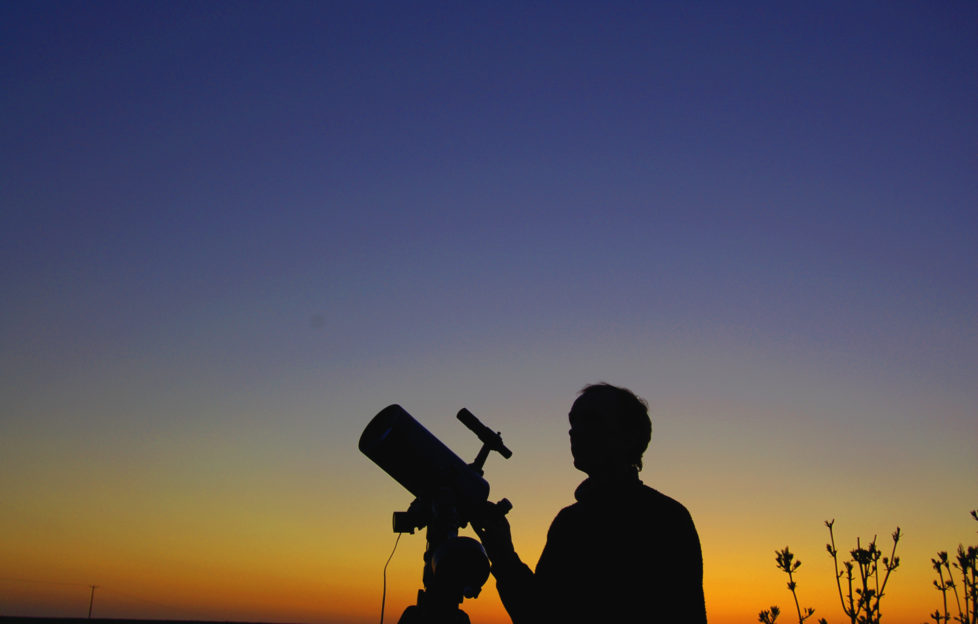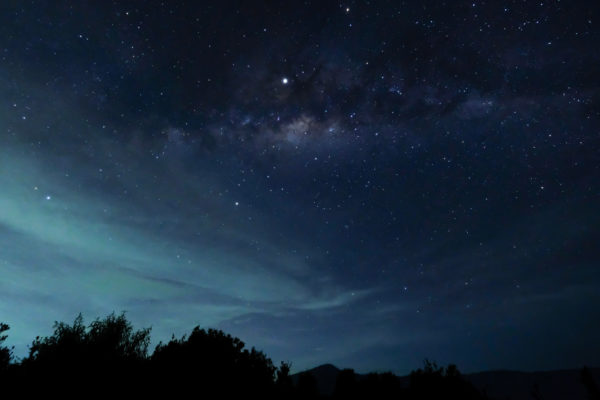
Today is National Meteor Watch Day, so here at “The People’s Friend” we’re turning our gaze upwards.
Want to know a little bit more about spotting meteors? Take a look at this piece by Roger McCann, written for Special 118 back in 2016!
It was dark. A cold wind whipped the last of the leaves from the trees. With a torch beam to light our way, my guide led me down a curving gravel path to a shed at the bottom of his garden.
Once inside, we hardly heard a sound. This garden shed is no ordinary storage space for bikes or tools. With a pull on an outside rope the whole roof slides open to reveal innumerable pinpoints of light glistening in the night sky.
My guide, Mike Alexander, has studied the stars since 1969. His early interest was sparked by blurry black and white pictures of the moon landing shown on televisions across the world. A book on astronomy he received in 1971 led to a desire to keep learning more.
“I just had to find out about the stars, the planets and whatever else is up there,” Mike said.
Now, the Galloway Astronomy Centre, run jointly by Mike and his wife Helen, attracts visitors who also want to know more.
Their cottage can accommodate a small number of paying guests, usually on a bed and breakfast basis, though some guests prefer to arrive in time for dinner as well.
“We organise everything around our guests’ needs,” Mike said. “If we have a group of absolute beginners who may not be able to recognise the shape of the Plough in the sky, I’ll happily start there, very slowly. Then I’ll explain the origin of constellations such as Leo the Lion or Aquarius the Water Carrier, which are groups of stars that appear as tiny bright dots in the sky alongside umpteen other tiny bright dots.

Shutterstock.
“The constellations don’t readily make shapes looking anything like the descriptive names given to them by the ancient Greeks. So they can be difficult to pick out.
“Then, using the centre’s telescopes, I can point out other wonders of the night sky. Planets; the craters of the moon; ring of Saturn; the moons of Jupiter. Looking much farther into space, our stargazers might be able to see the distant clouds of gas where new stars, perhaps one thousand light years away, are forming at this very moment. We might even be able to pick out other galaxies that are several million light years away!”
Mike points out that the Galloway Astronomy Centre is unique in Scotland.
“I don’t just leave our guests to play with a telescope. I’m there with them in the observatory, guiding them across the night sky.”
Like a teacher pointing at a chalkboard, Mike uses a laser pen to shine a beam that appears long enough to pick out individual stars. From them he can then trace the shapes of constellations. Mike readily acknowledges that people who may be interested in observing the night sky often assume they’ll need expensive equipment and especially a large telescope to get started. But that’s not the case.
First of all, prospective stargazers need to get to a place where it’s dark enough actually to see the stars. Then, with the naked eye, they’ll be able to see millions of heavenly bodies and a few passing satellites. A pair of relatively inexpensive 10 x 50 or
7 x 50 binoculars will help even more, along with a good star map.
Not so long ago, our ancestors would have been aware of the night sky. Today it’s good to know there are still places where we can be amazed by this nightly wonder.
Top tips for beginners
- You don’t need a telescope to view the stars, just a clear night and a pair of binoculars. You might need a tripod mount to hold the binoculars steady if you want to see the planets clearly.
- If you want to put names to the planets and constellations you can see, you’ll need a star map. Books and sky charts are great, but there are also apps that you can download to your mobile phone or tablet that will make identification much easier. Try Google’s Sky Map or Star Walk for Apple and Android devices. Both will tell you what is in the night sky in your location.
- To view celestial bodies beyond our nearer neighbours, you’ll need to look through a telescope. If you’re bitten by the astronomy bug you’ll probably want your own telescope in time, but before you invest, try out lots of different models to see what will suit you best.
- For those of us who struggle to see newspaper print at the end of our arms, the thought of picking out detail light years away can be daunting. However, some telescopes allow you to attach the viewfinder to a laptop computer and see the live pictures on the computer screen.
- There are lots of astronomy clubs around the country with enthusiastic members keen to share their knowledge with newcomers, so you should find someone to help. Visit www.astronomyclubs.co.uk to find your nearest club.
- Would-be astronomers need patience. Different stars are viewable at different times of the year, and weather conditions are not always favourable for viewing the skies.
Where to view the stars
- If the skies in your area are reasonably dark, your garden is a great place to start your observations.
- If you live in a city or large town, there may be too much light to see the stars and constellations so you may need to travel farther afield. Astronomy clubs often organise viewings for members.
- Local observatories often open to the public. Keep an eye on local press for details or visit the List at http://bit.ly/1P7ydIF.
- There are more than 100 “dark sky” sites in the UK. Visit www.darkskydiscovery.org.uk to find one near you.
- If you fancy a taster, the National Trust holds stargazing events suitable for the whole family throughout the year. Call your local National Trust office for news of forthcoming events. To find your nearest office visit www.nationaltrust.org.uk or call 0344 800 1895.
Enjoy National Meteor Day! Travel restrictions may still be in place. Please check latest advice before planning your trip.
For more fantastic Features from “The People’s Friend”, click here.




